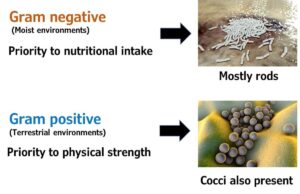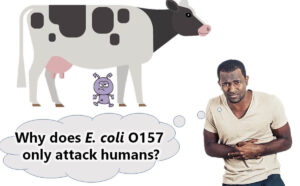Introduction to Food Microbiology
Why Are Gram-Negative Bacteria Mostly Rods? Exploring Cocci and Rods in Food Microbiology
In microbiology, one of the fundamental lessons is distinguishing between cocci and rods. But have you ever wondered why Gram-negative bacteria in food microbiology are predominantly rod-shaped? This article explores the fascinating reasons behind bacterial shapes, from nutrient uptake to environmental adaptation, revealing why cocci are rare among Gram-negative bacteria.
Organising Gram-Negative and Gram-Positive Bacteria: A Guide for Food Microbiology
In recent years, species identification based on 16S rRNA gene analysis has become increasingly popular. As a result, bacterial classification has become more intricate and complex. However, in the field of food microbiology, it is essential to grasp the broader framework before delving into detailed classifications. In a series of upcoming articles, I would like to discuss the microbial classification method, which serves as a useful mental toolbox for organizing and memorizing various Gram-negative and Gram-positive bacteria commonly encountered in food microbiology. The composition of this mental toolbox differs slightly between Gram-positive and Gram-negative bacteria, making it advantageous to internalize these frameworks.
E. coli O157: Why Only Humans Suffer Foodborne Illness While Cattle Remain Unharmed?
As a university professor specialising in food microbiology, I often address a compelling question: Why does E. coli O157 cause foodborne illness in humans while cattle remain unharmed? This curious phenomenon challenges our human-centric perspective on microbial relationships. In this article, we will delve into the complexities of this issue, exploring how E. coli O157 interacts with its hosts within the broader context of Earth's biological diversity. Join me as we uncover the interconnected narratives of microbes and their hosts, revealing insights that might shift our understanding of foodborne illnesses.
Microorganisms and Humanity: A Brief Encounter in Earth's 4-Billion-Year History
When studying food microbiology, it’s easy to focus solely on pathogenic microorganisms and their impact on humans. However, this perspective misses the bigger picture. In this article, we’ll explore humanity’s place in Earth’s 4-billion-year microbial history and challenge the human-centric view of microorganisms.



